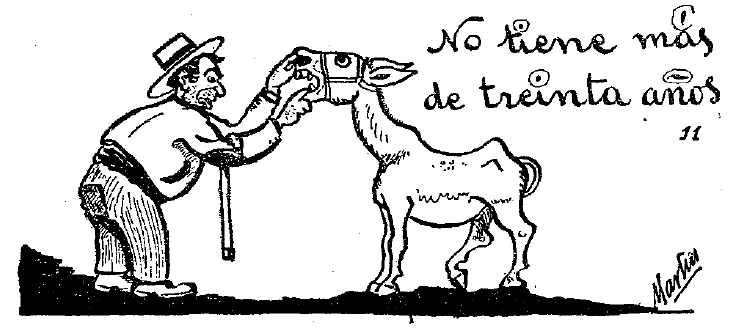
| Языки :: Испанский |
| Аудио |

 |
|
 |
|
|
Español |
Spanish |
| 32 | Lección Once (11) | |
| Compañeros de viaje (1) | Fellow-travellers [Companions of travel]. | |
| 1 |
No estoy solo en mi departamento; hay dos señoras que hablan español, y un señor que parece ingles. |
(I) am not alone in my compartment; there are two ladies who speak Spanish, and a gentleman who looks English. |
| 2 |
Me equivoco cuando digo que las dos señoras hablan : una sólo, la más vieja, habla. |
(I) am mistaken when (I) say that the two ladies speak; one only, the older one, speaks. |
| 3 |
Habla muy de prisa, en voz baja. Puede tener sesenta años. |
(She) speaks very quickly, in a low voice. (She) may be [have] sixty years (old). |
| 4 | La más joven, que no tiene más de
treinta años, escucha sin decir una palabra; parece triste. |
The younger one who is [has] no more than 30 years (old) listens without saying one word; she looks sad. |
| 5 | Yo también escucho, pero no comprendo ni una palabra (2). | I, too, listen, but I do not understand one [nor one] word. |
| 6 | El señor saca una pipa de su bolsillo y dice : | The gentleman draws a pipe from his pocket and says ; |
| 7 | ¿Les molesta el humo, señoras (3)? | Does the smoke disturb you [disturb them the smoke?], ladies. |
| 8 | Es un ingles, o por lo menos un extranjero, no hay duda. | He is an Englishman, or, at [for] the least a foreigner, there is no doubt. |
| 9 |
No solo porque tiene una pipa, sino (4) también porque le he comprendido sin dificultad : su español es de la misma clase que el mío. |
And not only because (he) has a pipe, but also because (I) have understood him without (any) difficulty; his Spanish is of the same class as mine. |
| EJERCICIOS | EXERCISE : | |
| 1 |
Perdone (or : Dispense), me he equivocado de departamento. |
Excuse (me) (I) have mistaken [me] [of] (the) compartment. |
| 2 | ¿Comprende usted? - Sí comprendo. |
Do you understand? - Yes (I) understand. |
| 3 |
¿Ha comprendido usted? -Sí, he comprendido. |
Have you understood? - Yes (I) have understood. |
| 4 |
¿Qué dice usted? |
What (do) you say? - What have you said? |
| 5 |
Yo no digo nada. - Yo no he dicho nada. |
I (do) not say anything [noth.]. - I have not said anything [noth.]. |
| NOTES. | |
| 1 |
The letter j can be pronounced easily once one has
heard it, but its sound is difficult to explain. |
| 2 |
También escucho, or Escucho también
would be : I listen too. With yo the meaning is thus reinforced : I, too, listen. |
| 3 |
Literally : them disturbs the smoke? (does the smoke disturb their Honours). |
| 4 |
Not only... but is said : no sólo... sino, and not pero. |
